2011 UK Business Leaders Travel Survey
PrivateFly White Paper by Jeremy Skidmore
PrivateFly conducted a survey on UK Business Leaders Travel in March 2011.
This paper reveals the results of a March 2011 online survey of UK business leaders about their business travel habits.
The research was undertaken by Clarity UK, an independent research group.
The results were analysed and several interesting key findings have emerged, which are detailed below in the White Paper written by business journalist Jeremy Skidmore.
For private jet charter prices, aircraft availability or advice call our 24/7 expert team on 020 7100 6960 .
The key findings included:
- Public transport is failing UK businesses
- Business travel future looks buoyant
- Business leaders mix the old with the new
- The growing allure of private jet travel
- Business travel likes & dislikes
Summary of key findings:
- Public transport is failing UK businesses
- Business travel future looks buoyant
- Business leaders mix the old with the new
- The growing allure of private jet travel
- Business travel likes & dislikes
UK Business Leaders 2011 Travel Survey
A White Paper By Jeremy Skidmore
CONTENTS
- Summary
- Methodology
- Audience Business Travel Profile
- Key Findings
- About Jeremy Skidmore
- About PrivateFly.com
SUMMARY
This paper reveals the results of an online survey (March 2011) of UK business leaders about their business travel habits. The results were analysed and, from the data, several key findings have emerged and are detailed below. Where appropriate, some context has been given to the answers.
The key findings to emerge are as follows:
- The lack of investment in transport and its supporting infrastructure is stifling UK businesses, according to senior executives. The majority of those surveyed (64%) believe this has had a bigger impact on business travel than anything else in the past decade – including advances in technology, globalisation or environmental concerns.
- Business leaders are wasting almost one working week per month using ineffective and unproductive travel methods. On average, executives are unable to work for 34 hours and four minutes each month.
- For the daily commute, the car is favoured by most business leaders (70%).
- Business leaders are economically optimistic about the future with 80% expecting to spend at least as much on business travel this year as they did in 2010. Some 45% of executives said their business travel expenditure would stay the same this year; while 27% expect it to increase by around 10%; and 8% of respondents expect it to increase by more than 25%. Only 19% expect their business travel expenditure to decrease.
- The overwhelming majority of business leaders believe face-to-face meetings are essential, despite the growth of mobile technology and web conferencing tools. Some 95% of those surveyed felt that meetings were either very important or important, while only 5% were neutral on the subject. No executives suggested face-to-face meetings were unimportant or very unimportant.
- Business leaders are embracing new technology in their working lives. Some 63% use webcams and video calls and 56% use internet telephony such as Skype. Though there are times when paper is preferred to a screen: 74% prefer to digest their news on paper while travelling, rather than on a digital device.
- Private jet travel is being chosen by a significant number of business leaders (18%) who are becoming increasingly frustrated with traditional methods of transport.
- Noise suppression headphones, medicine and even condoms are among the must-have items that senior executives take away with them when they travel on business.
- The majority of senior executives enjoy business travel despite the long delays, wasted time and hours away from home. Almost 70% claimed they enjoyed business travel.
- Airport delays and checks, the stress of arriving late at airports and missing family members are among the biggest frustrations about being away on business.
METHODOLOGY
The survey was conducted by research group Clarity Surveys on behalf of leading private jet booking platform PrivateFly.com.
An invitation to participate was sent out by email to a selected list of managing directors, chief executives and chairmen of UK companies with a turnover of over £100M. A link to the survey was also made available in targeted social media channels, predominantly relevant LinkedIn groups and via Twitter.
A total of 105 responses were generated and, given the specific nature and relatively small size of the target audience canvassed, Clarity Surveys believes there is a 95% accuracy rating in the results.
AUDIENCE BUSINESS TRAVEL PROFILE
Length of trip
- Over a third of our business leaders, 39%, spent between 6 and 10 days away on business travel each month during 2010.
- The next most popular choice was 3-5 days away (19%), while 15% of senior executives were away on business more than 16 days each month and a further 15% for between three and five days a month.
- Nearly 11% of people were away from 11-15 days, while 1% of the surveyed audience undertook no business travel at all.
Business travel destinations
- The most common destination for business travel was mainland Europe (81% of respondents), while 68% travelled in the UK and 37% went to America on business.
- Some 23% went to Asia, 11% to the Middle East and a further 11% to Africa, while 5% travelled to Australia on business.
Business travel expenditure
- The vast majority, 83%, spent under £50,000 in 2010 on business travel, with 11% spending between £50,000 and £100,000 and 3% spending £201,000 to £250,000.
- Only 1% spent in excess of £250,000 during the year and this was also the percentage figure for expenditure between £101,000 and £150,000 and between £151,000 and £200,000.
- Only 60% of business leaders said they had a standard travel policy, while 36% stated they did not have one and 4% were unsure. Just over a third, 34%, have reviewed or introduced a policy in the past 12 months.
KEY FINDINGS
Public transport is failing UK businesses
(a) Lack of investment stifles business
The lack of investment in transport and its supporting infrastructure is stifling UK businesses, according to senior executives.
The majority of those surveyed, 64%, believe it has had a bigger impact on business travel than anything else in the past decade. It is possible that this figure will rise further in future, as the government announced in October 2010 that capital spending on transport would fall over the next four years by 11% from the annual £13.6bn budget. However, 21% believe the biggest impact has come from an improvement in the quality of transport and more links/connections.
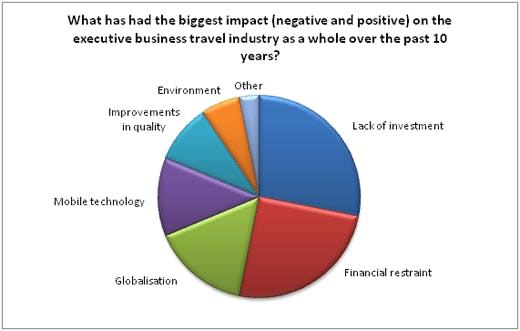
Over a quarter of those surveyed, 28%, said they would use trains less frequently for business if fares continue to rise above inflation, while 18% were unsure if they would change their behaviour. As the government has announced that from 2012 rail fares can rise by 3% above inflation, this should lead to more executives seeking alternative transport methods.
Some 19% said the increase in flight duty and the cost of insurance will lead to a reduction in the amount of air travel they conduct for business. Air Passenger Duty (APD) rates currently range from £12 to £170, depending on the distance flown and class of seat, although plans to increase these rates have been frozen until April 2012.
Over half of business leaders (57%) claim financial restraint and stricter corporate travel policies have had the biggest impact on business travel over the past decade.
Some 36% claim globalisation and the need to meet staff, suppliers and customers outside the UK is the biggest change they've seen, while 29% opt for mobile technology, which allows executives to work outside office hours.
Environmental concerns, including CO2 emissions and corporate social responsibility have had the greatest impact on business travel, according to 14% of those surveyed.
(b) One week per month wasted by travelling
Business leaders are wasting almost one working week per month using ineffective and unproductive travel methods. On average, executives are unable to work for 34 hours and four minutes each month; some six hours and 27 minutes are wasted on train travel, 11 hours and 48 minutes on air travel and some 15 hours and 45 minutes on travelling by car.
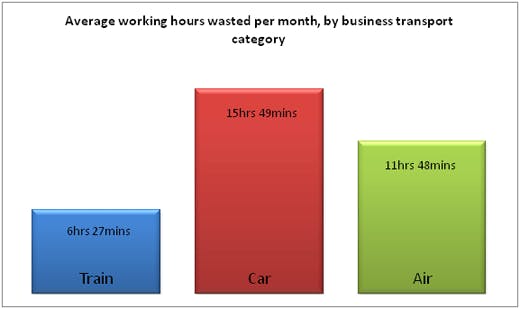
Executives were asked to score from 0-5 for various attributes of different forms of business transport. Anything less than the mid-point of 2.5 was seen as a negative score and anything higher was a positive score.
Underground trams and local trains are viewed as the least productive forms of transport scoring 1.48 out of 5, presumably because they are often overcrowded. This was also rated as the least comfortable mode of transport, with a rating of 1.65 for comfort and style.
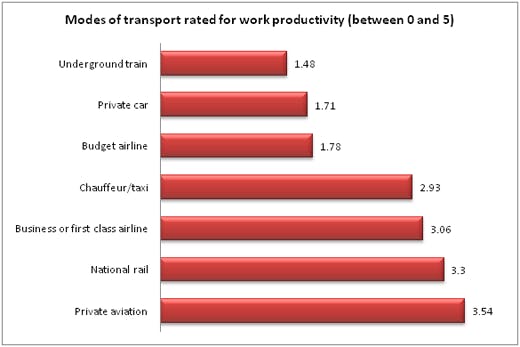
National rail services scored highly for productivity and comfort and style, with the categories registering 3.3 and 3.04 respectively. Budget airlines may have been the most cost effective mode of transport, but scored poorly in other areas. For work productivity they had a rating of 1.78 and for comfort and style, 1.83.
By contrast, business and first class travel received a rating of 3.06 for work productivity and 3.65 for comfort and style.
Private aviation is seen as the most productive form of travel, scoring 3.54 for work productivity and 4.32 for comfort and style.
Not surprisingly, the car scored poorly for work productivity (1.71), while the chauffeur/taxi option was above average at 2.93, as business leaders can work while letting others drive. For comfort and style, the car rates more highly, at 3.56, than the chauffeur/taxi, at 3.4. This is possibly because senior executives tend to have luxurious cars.
(c) Car still the favourite for the daily commute
For the daily commute, the car is favoured by most business leaders (70%). This may be a reflection on the lack of investment in public transport. However, the survey was completed by a considerable number of business executives in London, which has the most advanced public transport infrastructure in the UK, so the continuing desire to use the car may be due to convenience, comfort and habit - suggesting that public transport still has much to achieve to win over this audience.
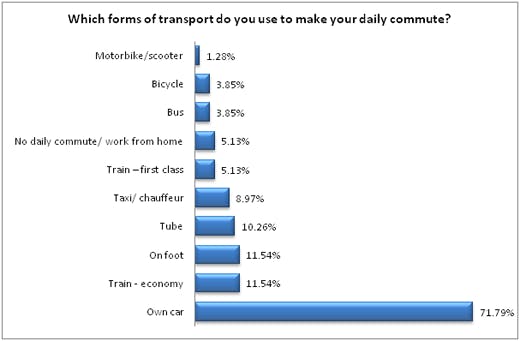
The majority, 56%, said the rising cost of fuel and motoring in general will not change the way they use their car. However, 33% said increasing costs will lead to them making a change and 11% were unsure, which suggests the rock-solid allegiance to the car could waiver in the future.
Some 11% travel by train in economy class and only 5% in first class, which indicates that companies may be cutting back on some expenditure for executives. However, this observation needs to be balanced against the fact that 9% travelled to work by taxi or chauffeur.
The underground was the chosen mode of transport for the daily commute by 10% of people, while 4% took a bus and a further 4% a bicycle. Only 1% commuted on a motorbike or scooter. Some 12% of business leaders live sufficiently near to their place of work that they are able to commute on foot.
Despite advances in mobile technology that allow people to work from most places in the world, it is perhaps surprising that so many business leaders are still tied to the daily routine of travelling to their work place. Only 5% said they don't commute daily and sometimes work from home.
Business travel future looks buoyant
Business leaders gave an optimistic indicator for the immediate future of business travel with 80% expecting to spend at least as much on business travel this year as they did in 2010.
Some 45% of executives said their business travel expenditure would stay the same this year, while 27% expect it to increase by around 10% and 8% of respondents expect it to increase by more than 25%. Only 19% expect their business travel expenditure to decrease.
The survey responses suggest that businesses are more confident than they were during the credit crunch and recession, and back-up findings from elsewhere. A Deloitte online survey1 of 1,001 business travellers published in September 2010 returned similar findings, with 24% of respondents planning to take more business trips in 2011 than they did last year, and 56% expecting to make the same number of trips.
The responses are also due to reluctance among business leaders to move away from tried and trusted ways of conducting business, such as face-to-face meetings (see below).
Business leaders mix the old with the new
(a) Technology cannot replace face-to-face meetings
The overwhelming majority of business leaders believe face-to-face meetings are essential, despite the growth of mobile technology. Some 95% of those surveyed felt that meetings were either very important or important, while only 5% were neutral on the subject. No executives suggested meetings were either unimportant or very unimportant.
In addition, business leaders are sticking rigidly to some old habits. Nearly three quarters (74%) prefer to receive their news from a paper, while 26% read news on a digital device such as an iPad, iPhone or laptop.
y
Despite their reluctance to relinquish their newspapers on the move, business leaders are embracing new technology in their working lives.
Some 63% used webcams and video calls and 56% used internet telephony such as Skype.
Instant messaging is used by 36% of business leaders, while 17% use social media such as Plaxo, LinkedIn, Twitter and Facebook. This is significantly lower than the figure for business travellers generally; a survey by Amex in July 20102 found that 50% of them were using social media for travel management.
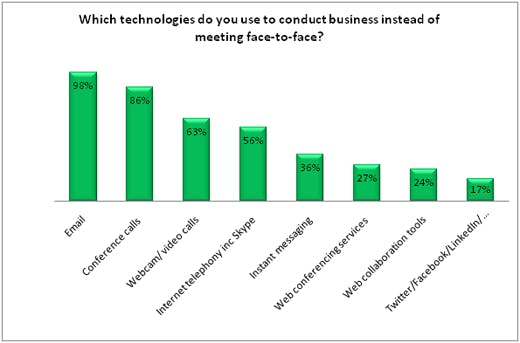
Web collaboration tools are used by 24% of executives while 27% use web conferencing services. Not surprisingly 98% of business leaders use email to conduct business and 86% use conference calls.
The growing allure of private jet travel
Private jet travel is being chosen by a significant number of business travellers who are becoming increasingly frustrated with traditional methods of transport. The survey reveals that the perception of private jet travel being solely the domain of the rich and famous is wide of the mark; private jet travel has been used by almost one fifth of business leaders (18%).
This is set to continue in an upward trend, as statistics show that private jet use is continuing to grow. There were 693,500 business aviation flights in Europe in 2010, equating to 7.3% of all aircraft flight movements, compared with 6.9% in 2009. Eurocontrol predicts a 7% annual growth in business aviation in 2011 and 2012, and 4 - 5% annual growth from 2013 – 20153.
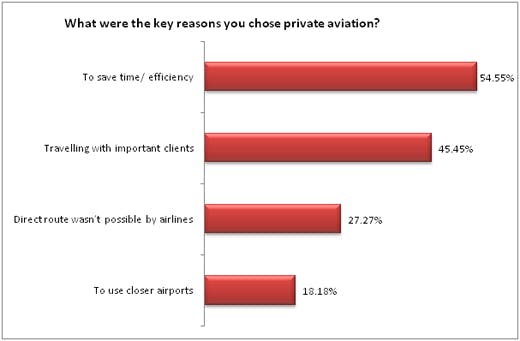
- The main reason for choosing private jet travel is because it saves time and is the most efficient mode of transport, according to 55% of those who had used private aviation.
- Nearly half (45%), chose private aviation so that they could travel with important clients. This may have been to make a positive impression, as well as enabling them to conduct business en-route in a comfortable and confidential environment.
- Some 18% of business leaders chose private jets because a direct route to their chosen destination wasn't offered by commercial airlines.
- Of those senior executives who had experienced private jet travel, 44% had flown twice during 2010, 33% four times and 22% once.
Changes in government policy are unlikely to deter business travellers from using private jets. In this year's budget it was announced that Air Passenger Duty (APD) is to be levied on private jet passengers and the government is currently consulting on the best way to collect the money. However, Adam Twidell, CEO and founder of PrivateFly, said: "Passengers would accept the need to pay APD, assuming it's calculated on the same basis as scheduled airlines, which would add a relatively small amount to their costs."
According to industry experts, in the post-recession period, business travellers have been examining their travel budgets and looking at the possibility of using ad-hoc private charter, which operates on a 'pay-as-you-go' format, rather than the upfront financial commitment of aircraft ownership, fractional ownership or card schemes. Increased price competitiveness from private jet operators and the wider availability of 'air taxis' and very light jets are lowering the entry price for customers.
Ken McLeod, corporate director of Advantage Travel Centres, the UK's largest consortium of independent business travel agents has cited PrivateFly as being influential in improving links between private jet charter and the broader business travel industry. He said "With PrivateFly.com our travel agents can now compare and buy private jet charter on behalf of their clients as easily and quickly as other travel products, which has often been viewed as a complex requirement in the past. We are delighted to be giving our clients the very best choice and price transparency for private jet charter."
Business travel likes & dislikes
The business leaders were also asked about their biggest travel frustration and their must-have travel items.
- Airport delays and checks, the stress of arriving late at airports and missing family members among the biggest frustrations about being away on business.
- "Not being able to spend time with your family," was the worst part of business travel, according to one executive, while another cited "queues in airports, security and check-in and, of course, delays" as a major frustration. Meanwhile, the work that piles up when you are away on business was the biggest problem for some executives. Poor connections between hotels and airports were also reported as annoying by business leaders.
- Noise suppression headphones, medicine and even condoms were among the must-have items that senior executives take away with them when they travel on business.
- Also included on the list of things that business travellers can't live without were contact lenses, gym wear, photos, books and wallets.
- The phone or smartphone topped the list of most important items for business trips, closely followed by a laptop, with clothes and normal accessories third and passport fourth.
The majority of senior executives enjoy business travel despite the long delays, wasted time and hours away from home. Some 69% enjoyed business travel, while 31% did not.
ABOUT JEREMY SKIDMORE
Jeremy Skidmore has been a journalist for over 25 years. He was editor of industry newspaper Travel Weekly and has written on travel and business issues for several national and trade newspapers and websites.
ABOUT PRIVATEFLY.COM
PrivateFly.com is a revolutionary online booking platform that allows private jet customers to compare the market for available private charter aircraft - at the lowest prices. It was recently awarded Website of The Year in Flight International's 'Webbies' awards which recognise online excellence across the whole of the aviation industry - the judges describing it as "the iTunes" of aviation. PrivateFly was ranked as the fastest growing company in terms of sales growth in the UK aircraft charter industry by Plimsoll Business Intelligence 2011. PrivateFly's sales grew by 76% in the year to May 31 2010 and are forecast to rise by 59% in 2010/11.
Commenting on the survey results, Adam Twidell CEO of PrivateFly.com says: "For top business people, efficiency in travel is key – including the ability to work while on the move. It's clear that enormous amounts of highly-paid working hours are wasted by unproductive business transport. Private aviation offers a flexible - and often cost effective - option for business travel, particularly where there are multi-leg journeys or indirect routes involved."
Footnotes
1 Deloitte's 2010 Business Traveler Survey
2 American Express 'Social Media in Business Travel Management' July 2010
3 EuroControl Briefing: Business Aviation in Europe in 2010
For a personalised quote or further information on private jet hire, visit PrivateFly.com, call 020 7100 6960 or email enquiries@privatefly.com


